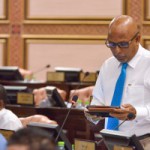A six year-old girl died at Male’s ADK hospital on Tuesday shortly after being admitted with dengue fever complicated by respiratory difficulties.
Referred to as ‘Dengue Shock Syndrome’, ‘Dengue Haemorhaggic Fever’, or ‘severe dengue’, this type of complication greatly increases the risk of death in cases as blood pressure drops to dangerous levels.
“The girl was brought in at 4:00pm, gasping, blue, in a critical condition and was taken to the intensive care unit where she died,” said the hospital’s Managing Director, Ahmed Afaal.
Afaal was not yet able to confirm the girl’s home island, but confirmed that there would be a thorough investigation into the case as it involved dengue.
Her death is the first dengue-related death to have been recorded this year. A record 12 deaths last year were mostly children suffering from similar complications. Instances of the disease have been rising steadily both within the Maldives and globally.
Health Minister Dr Ahmed Jamsheed he was unable to comment on the issue, as he said he was engaged in SAARC meetings. He did, however, say that a communicable diseases paper would be discussed at the meeting.
The Centre for Community Health and Disease Control (CCHDC) issued its first warning of the year on March 20, blaming the large amount of construction work in the capital and pools of stagnant water, which serve as breeding grounds for dengue-carrying mosquitoes.
According to the World Health Organisation (WHO) the specific type of insect that carries dengue, the Aedes Aegypti Mosquito, is unusual in that it bites during the daytime. Once infected, humans are the most prominent carriers of the dengue illness, passing the strain on to other mosquitoes when bitten.
The organisation estimates that between 50 and 100 million people a year are infected, with 40 percent of the world’s population at risk. It advises that dengue should be suspected whenever a high fever is accompanied by any of the two following symptoms: severe headaches, pain behind the eyes, muscle and joint pains, nausea, vomiting, swollen glands, a rash.
It can be difficult to distinguish from the milder Chikungunya disease that can last for up to five days. Even healthy adults can be left immobile by dengue for several weeks while the disease runs its course.
Prevention rather than cure
The government has attempted to raise awareness of the disease in order to prevent the spread of what remains an illness without a specific cure.
After last summer’s outbreak was labelled an epidemic by the government, the Maldives National Defence Force (MNDF) was drafted in to assist with spraying breeding sites, although it did encounter difficulties in accessing some sites.
Such instances led to calls from the now Health Minister Ahmed Jamsheed, head of the CCHDC at the time, for the introduction of a Health Protection Bill that would provide “sufficient resources to ongoing efforts on community education, awareness and health promotion, access to premises with mosquito breeding and legal action against those who do not comply with the law or regulations.”
At the time of last month’s warning Public Health Programme Coordinator for the CCHDC, Dr Fathmath Nazla Rafeeq shared her concerns over the lack of public attention to the Centre’s alerts.
“Since December [2010] we had warned about the increase in dengue cases. But most of the people don’t even remember. They assume that mosquitoes should be controlled if there is a dengue outbreak and everything will be okay when authorities spray fog,” Nazla observed. “Therefore, on most islands, its [mosquito control] is highly neglected. Once dengue starts to spread, people panic”.
She also added that another epidemic would be inevitable if the authorities did not consistently eradicate breeding areas.





How do doctors diagnose Dengue Hemorrhagic Fever in a 12 month old infant? The kid has not learned to speak or complain...?? See... That is the reason Dengue is not being picked up early on. More Pediatricians need to be on the Islands and good Local MOs rather than being in Male, Dho!
"Health Minister Dr Ahmed Jamsheed he was unable to comment on the issue, as he said he was engaged in SAARC meetings. He did, however, say that a communicable diseases paper would be discussed at the meeting." SERIOUSLY?!!! Well maybe in that case Dr Jamsheed should stop attending SAARC meetings and first of all understand the dire state of our health system! Doesn't he even have senior people in the ministry capable of briefing him? What a joke this is!